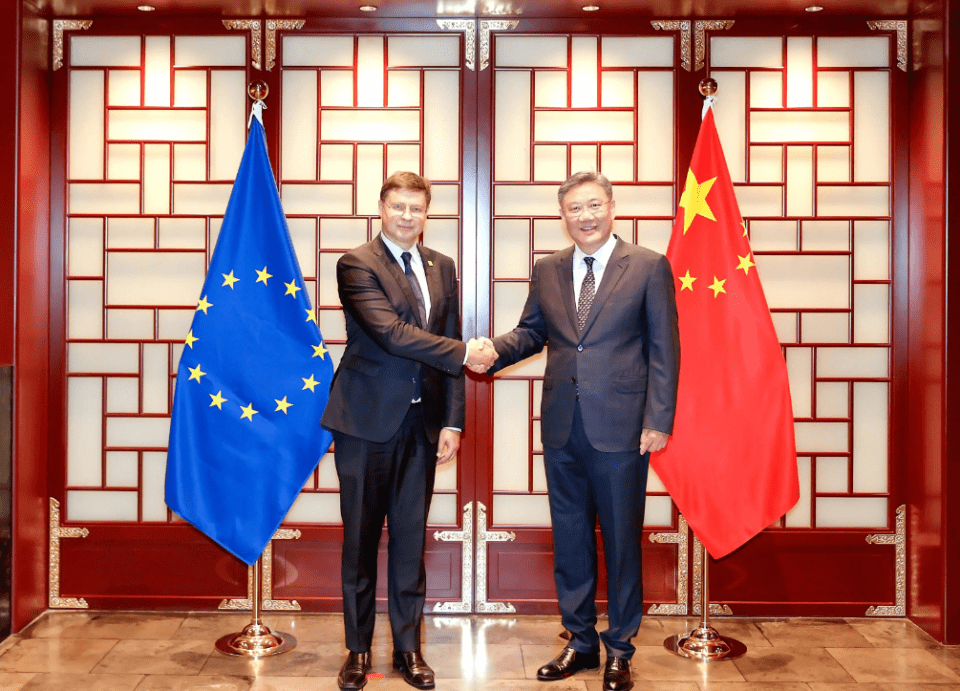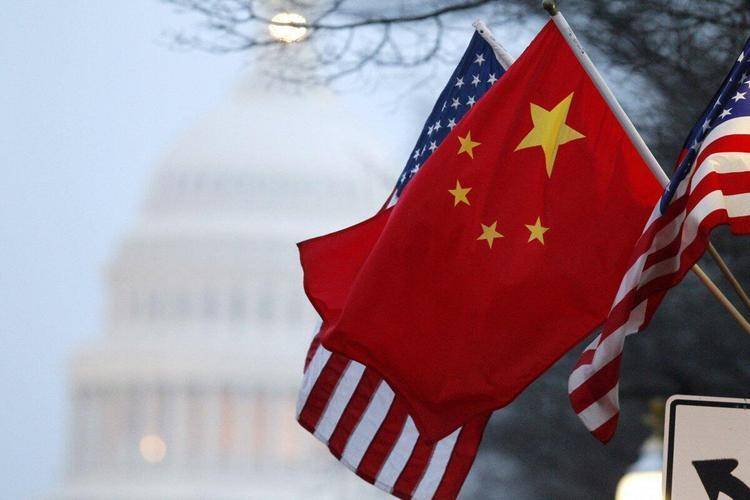 Technology peripherals
Technology peripherals
 AI
AI
 25 countries including China, the United States and Europe signed a declaration agreeing to establish AI regulatory methods
25 countries including China, the United States and Europe signed a declaration agreeing to establish AI regulatory methods
25 countries including China, the United States and Europe signed a declaration agreeing to establish AI regulatory methods
Not long ago, the U.S. government just tightened the technological blockade against China in the fields of semiconductors and artificial intelligence. However, U.S. allies obviously did not buy it. The rewritten content, which has always been tough on China, read: Chinese Prime Minister Sunak even Chinese technical personnel are strongly invited to participate in the World Artificial Intelligence Security Summit held in the UK recently.
At this summit, 25 countries, including China, the United States and Europe, signed the "Bletchley Declaration" and reached a consensus on establishing a regulatory mechanism for artificial intelligence (AI). In other words, in the future, the United States will no longer have the final say in the field of AI technology, and China will also have a say.

U.S. Secretary of Commerce Raimondo (first from left), Chinese Vice Minister of Science and Technology Wu Zhaohui (first from right)
Wu Zhaohui, Vice Minister of Science and Technology of China, emphasized at this summit that artificial intelligence involves the future and destiny of human development. While strengthening technology risk supervision, we should also narrow the technological gap between developed and developing countries, strengthen multilateral cooperation, and achieve mutual benefit and win-win results
It must be said that China’s statements in specific technical fields still demonstrate the vision and pattern of a great power. Nowadays, China’s participation in science and technology summits mainly in European and American countries is by no means just representing China itself, but representing the vast majority of people. Developing countries speak out.
Highlights China's practice of the global "three major initiatives", and at the same time once again proves to the world that China's development brings opportunities rather than challenges, and is truly committed to building a community with a shared future for mankind, rather than being like some countries. The pursuit of technological hegemony and one-stop dominance

AI
China is a world leader in the field of artificial intelligence. The total number of related patent applications in the past year accounted for more than 40% of the world's total, nearly double that of the United States. Moreover, this advantage is still expanding year by year
China’s leading position in the fields of clean energy and communications, as well as its large number of patents, give China a greater say in this field. In other words, some of China’s industry standards can largely represent world standards
The reason why Britain did not follow the United States and exclude China this time is because it had to recognize a reality - in certain technical fields, it is impossible to do without China, and "decoupling and cutting off links" with China is tantamount to jeopardizing the future. And China has indeed gained the opportunity to negotiate at the table by relying on technological innovation and overtaking in corners, and it also has the qualifications to formulate rules in key technological fields.

Rewritten content: Chinese Prime Minister Sunak
China’s technological breakthrough is another major setback for the United States in its policy of technological blockade against China. The United States' choice to co-sign relevant agreements with China reflects that China indeed has irreplaceable influence in the field of artificial intelligence
In a situation where Europe and the United States also have a need for cooperation with China, if the United States forcibly blocks China's participation for its own selfish interests, it will not only be unable to share Chinese technology, but will also offend Europe and aggravate the division of Atlantic relations. This is obviously unwise for the Biden administration, which is eager to pursue political achievements in order to win votes, so it must still make compromises when it is time to compromise
Since Biden issued export control orders targeting three major fields including semiconductors, the EU has begun to take countermeasures and intends to strengthen economic, trade, investment and technological cooperation with China. To this end, the EU introduced the "EU Chip Bill" and conducted a new round of high-level strategic dialogue with China

EU Trade Official Dombrovskis, Chinese Minister of Commerce Wang Wentao
The reason is very simple. The United States' unilateral suppression of China may also affect its allies. If the EU follows the United States closely, the result will inevitably be a "lose-lose situation for China and Europe." For China, as an industry leader, actively participating in this technology summit is actually part of the implementation of the “One Belt, One Road” initiative.
At the previous International Cooperation Summit Forum, China systematically elaborated on China’s plans around artificial intelligence. At that time, China promised that China would respond to the scientific and technological concerns of developing countries and actively participate in national mechanisms and co-governance systems. Contribute Chinese wisdom to the world.
It can be seen that although China has the right to speak in the field of artificial intelligence, it has not erected technical barriers like the United States. Instead, it has shared its development results with the world, making China and the world win-win. To this end, China has also announced the complete lifting of restrictions on foreign investment in manufacturing in order to more fully integrate and collide technology, capital and competition with other countries around the world, and to continuously strengthen itself in cooperation and competition.

In order to rewrite the content without changing the original meaning, the language needs to be rewritten into Chinese, and the original sentence does not need to appear
Of course, the signing of an agreement between China and many European and American countries does not mean that the latter have completely changed their attitude of containing and guarding against China. Rather than believing that the United States views China’s rise correctly and expecting the EU to have strategic autonomy, it is better to take the initiative In order to rewrite the content without changing the original meaning, the language needs to be rewritten into Chinese. The original sentence and China-Europe relations do not need to appear, and the zero-sum game and the myth of hegemony can be defeated through in-depth communication and interaction.
The above is the detailed content of 25 countries including China, the United States and Europe signed a declaration agreeing to establish AI regulatory methods. For more information, please follow other related articles on the PHP Chinese website!

Hot AI Tools

Undresser.AI Undress
AI-powered app for creating realistic nude photos

AI Clothes Remover
Online AI tool for removing clothes from photos.

Undress AI Tool
Undress images for free

Clothoff.io
AI clothes remover

Video Face Swap
Swap faces in any video effortlessly with our completely free AI face swap tool!

Hot Article

Hot Tools

Notepad++7.3.1
Easy-to-use and free code editor

SublimeText3 Chinese version
Chinese version, very easy to use

Zend Studio 13.0.1
Powerful PHP integrated development environment

Dreamweaver CS6
Visual web development tools

SublimeText3 Mac version
God-level code editing software (SublimeText3)

Hot Topics
 1665
1665
 14
14
 1424
1424
 52
52
 1322
1322
 25
25
 1270
1270
 29
29
 1250
1250
 24
24
 How to use the chrono library in C?
Apr 28, 2025 pm 10:18 PM
How to use the chrono library in C?
Apr 28, 2025 pm 10:18 PM
Using the chrono library in C can allow you to control time and time intervals more accurately. Let's explore the charm of this library. C's chrono library is part of the standard library, which provides a modern way to deal with time and time intervals. For programmers who have suffered from time.h and ctime, chrono is undoubtedly a boon. It not only improves the readability and maintainability of the code, but also provides higher accuracy and flexibility. Let's start with the basics. The chrono library mainly includes the following key components: std::chrono::system_clock: represents the system clock, used to obtain the current time. std::chron
 How to understand DMA operations in C?
Apr 28, 2025 pm 10:09 PM
How to understand DMA operations in C?
Apr 28, 2025 pm 10:09 PM
DMA in C refers to DirectMemoryAccess, a direct memory access technology, allowing hardware devices to directly transmit data to memory without CPU intervention. 1) DMA operation is highly dependent on hardware devices and drivers, and the implementation method varies from system to system. 2) Direct access to memory may bring security risks, and the correctness and security of the code must be ensured. 3) DMA can improve performance, but improper use may lead to degradation of system performance. Through practice and learning, we can master the skills of using DMA and maximize its effectiveness in scenarios such as high-speed data transmission and real-time signal processing.
 How to handle high DPI display in C?
Apr 28, 2025 pm 09:57 PM
How to handle high DPI display in C?
Apr 28, 2025 pm 09:57 PM
Handling high DPI display in C can be achieved through the following steps: 1) Understand DPI and scaling, use the operating system API to obtain DPI information and adjust the graphics output; 2) Handle cross-platform compatibility, use cross-platform graphics libraries such as SDL or Qt; 3) Perform performance optimization, improve performance through cache, hardware acceleration, and dynamic adjustment of the details level; 4) Solve common problems, such as blurred text and interface elements are too small, and solve by correctly applying DPI scaling.
 What is real-time operating system programming in C?
Apr 28, 2025 pm 10:15 PM
What is real-time operating system programming in C?
Apr 28, 2025 pm 10:15 PM
C performs well in real-time operating system (RTOS) programming, providing efficient execution efficiency and precise time management. 1) C Meet the needs of RTOS through direct operation of hardware resources and efficient memory management. 2) Using object-oriented features, C can design a flexible task scheduling system. 3) C supports efficient interrupt processing, but dynamic memory allocation and exception processing must be avoided to ensure real-time. 4) Template programming and inline functions help in performance optimization. 5) In practical applications, C can be used to implement an efficient logging system.
 How to measure thread performance in C?
Apr 28, 2025 pm 10:21 PM
How to measure thread performance in C?
Apr 28, 2025 pm 10:21 PM
Measuring thread performance in C can use the timing tools, performance analysis tools, and custom timers in the standard library. 1. Use the library to measure execution time. 2. Use gprof for performance analysis. The steps include adding the -pg option during compilation, running the program to generate a gmon.out file, and generating a performance report. 3. Use Valgrind's Callgrind module to perform more detailed analysis. The steps include running the program to generate the callgrind.out file and viewing the results using kcachegrind. 4. Custom timers can flexibly measure the execution time of a specific code segment. These methods help to fully understand thread performance and optimize code.
 Quantitative Exchange Ranking 2025 Top 10 Recommendations for Digital Currency Quantitative Trading APPs
Apr 30, 2025 pm 07:24 PM
Quantitative Exchange Ranking 2025 Top 10 Recommendations for Digital Currency Quantitative Trading APPs
Apr 30, 2025 pm 07:24 PM
The built-in quantization tools on the exchange include: 1. Binance: Provides Binance Futures quantitative module, low handling fees, and supports AI-assisted transactions. 2. OKX (Ouyi): Supports multi-account management and intelligent order routing, and provides institutional-level risk control. The independent quantitative strategy platforms include: 3. 3Commas: drag-and-drop strategy generator, suitable for multi-platform hedging arbitrage. 4. Quadency: Professional-level algorithm strategy library, supporting customized risk thresholds. 5. Pionex: Built-in 16 preset strategy, low transaction fee. Vertical domain tools include: 6. Cryptohopper: cloud-based quantitative platform, supporting 150 technical indicators. 7. Bitsgap:
 Steps to add and delete fields to MySQL tables
Apr 29, 2025 pm 04:15 PM
Steps to add and delete fields to MySQL tables
Apr 29, 2025 pm 04:15 PM
In MySQL, add fields using ALTERTABLEtable_nameADDCOLUMNnew_columnVARCHAR(255)AFTERexisting_column, delete fields using ALTERTABLEtable_nameDROPCOLUMNcolumn_to_drop. When adding fields, you need to specify a location to optimize query performance and data structure; before deleting fields, you need to confirm that the operation is irreversible; modifying table structure using online DDL, backup data, test environment, and low-load time periods is performance optimization and best practice.
 How to use string streams in C?
Apr 28, 2025 pm 09:12 PM
How to use string streams in C?
Apr 28, 2025 pm 09:12 PM
The main steps and precautions for using string streams in C are as follows: 1. Create an output string stream and convert data, such as converting integers into strings. 2. Apply to serialization of complex data structures, such as converting vector into strings. 3. Pay attention to performance issues and avoid frequent use of string streams when processing large amounts of data. You can consider using the append method of std::string. 4. Pay attention to memory management and avoid frequent creation and destruction of string stream objects. You can reuse or use std::stringstream.



